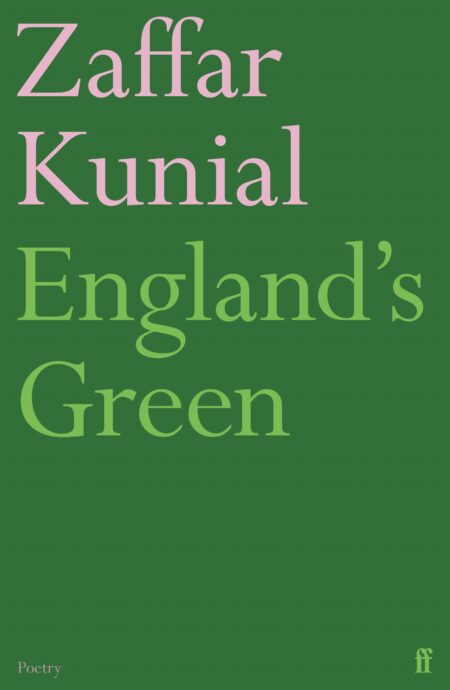England’s Green (Shortlisted, TS Eliot Prize)
Zaffar Kunial
(Faber & Faber, 2022); pbk: £10.99
England’s Green is Zaffar Kunial’s second poetry collection. Everything about England in our cultural subconscious is intimated beautifully in these two words; the reader knows intuitively that within these pages there will be a world of exploration on that theme. Kunial’s previous collection, ‘Us’, was shortlisted for many poetry prizes, and was highly praised for its ‘ability to find meaning and symbolism in the hearth and home’. This collection undoubtedly sustains that investigation into the meaning of ‘home’.
Born in Birmingham, Kunial now lives in Hebden Bridge. His father is Kashmiri and his mother English. Much of his poetry addresses this mixed-race background but it also investigates the English language itself.
The collection is split into two sections, ‘In’ and ‘Out’. These section titles suggest several allusions: to a cricket match, the game featuring in many poems; to the state of being included in or excluded from society; or to sexual orientation, hidden or declared. Short epigraphs at the start each of these section breaks provide definitions or examples of the section titles.
Kunial has great ability to take words apart in an almost forensic manner, homing in on letters and syllables within words and the sounds that they produce to make us pause over them.
In the seven line poem, ‘O’, he describes a childhood memory of imagined sound.
Used to think I could hear voices under the ivy. Small, scrunched voices. Opening. No, I would think and then hear them again at the end of the o. No, I would think. No.
Most of the poems are short, apart from ‘Ings’, the last poem in section one. Ings is a village that the poet visits for the first time on foot, having driven past it many times. He muses on the many words that hold emotions ending in the letters ‘ings’.
There is something Locked-in about grief, but there is something Horribly unlocked about grieving.
In ‘Foregrounds’, Kunial remembers his father and grandfathers through their specific interests or characteristics, though his Kashmiri grandfather died before the poet was born due to a snake bite. Memories becomes a way to illustrate the complexity of his racial origins, how culture and language shaped his development:
An old flinch, Wanting to correct my father’s version Of Himalaya. He said the end like the clipped end of Cordelia. The a before – the syllable I’d trim at the heart, he drew out as aahhh: Himaahhhlia.
In the second section, ‘Out’, Kunial focusses more closely on his life in Yorkshire and particularly the village of Howarth, where the Brontë sisters grew up. Several poems deal with their legacy. In ‘Brontë Taxis’, he visits the parish and hears church bells.
the word parochial and then precarious — The whole village almost clings to the hill, as if stalled by the syllables of a spell[.]
Later in the poem, he examines the root of the name ‘Brontë’.
and I think of that low rooted y In the Ulster name Prunty — A forked hawthorn at the end Of border-country[.]
The poem, ‘Scarborough’, is a memorial to Anne Brontë and to the poet’s mother, whose middle name was Ann. Brontë died and is buried in Scarborough, where she travelled in hope of a cure for illness. During the 19th Century, the sea was believed to have health-giving properties, but Anne did not survive her trip to the seaside.
Banking on your life, ill, you’d go east, days from your end – for what? A picked-up pebble? And there, the sea’s drum, its unloosable knot, like the mum cancer took early.
This section also contains poems about cricket, the game that is synonymous with colonialism. In ‘Anglish’, a prosaic subject is transformed into gems of linguistic exploration:
the bat being the steady consonants, the angle being a vow- el.
This beautiful collection speaks to identity, memory and language in an original and exciting way.
Jenny Gorrod


Leave a Reply